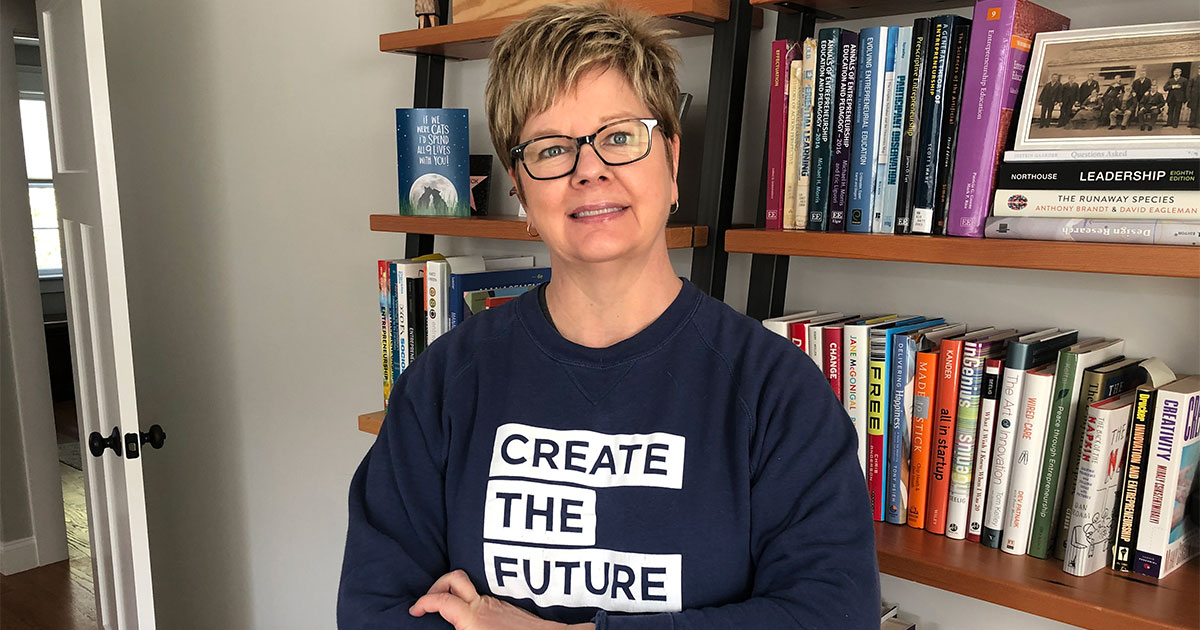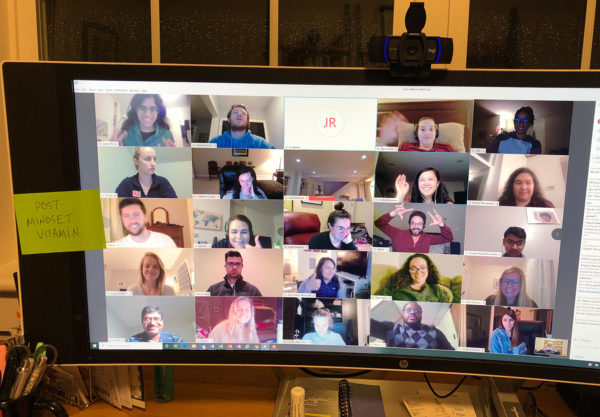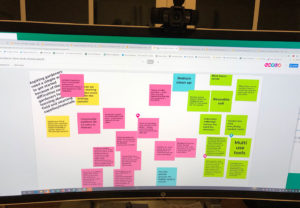Experiments and Adventures in Online Learning

Do something you’ve never done before.
That’s the daring assignment Heidi Neck gave the MBA students in her entrepreneurship course this semester. The assignment is something she calls a “mind shift,” an activity that, while small, is meant to challenge students and make them think more bravely and creatively.
“This is a courage-building activity,” says Neck, the Jeffry A. Timmons Professor of Entrepreneurship at Babson College. “I wanted students to do something different.”
Something different is exactly what Neck has been up to this semester. Her course, as with all of Babson’s educational offerings, has moved online because of the pandemic, and that switch has brought with it experimentation. “It has forced me to look at things in a new way,” says Neck.

On screen with Heidi Neck’s class on entrepreneurship.
That has meant trying out technology tools and novel assignments, including the mind shift, which nudged students to tackle a host of daunting tasks, from asking for a promotion, to trying out meditation, to giving a haircut to a dad in need of one. One student finally stopped procrastinating and began the book he always wanted to write.
Such is the adventurous and downright daredevil spirit that can be witnessed in the online classroom, a world that also has brought along a few surprises for Neck herself.
Creating Community
This semester marks the first time that Neck has taught a course completely online. She admits that online teaching wasn’t something she sought out. “I feel like I am a very experiential teacher with a lot of activities,” she says. “I thought that would be difficult to do online.”
Serving as an introduction to entrepreneurship and beginning right after spring break, her online course offerings emphasize the entrepreneurial mindset and opportunity creation. It originally was set to take place at Babson’s Boston location, but while Neck misses being in the same physical space as her students, she has found that many of her concerns about online teaching have proven unfounded. “I have been able to create more interaction than I thought I could,” she says. “It has convinced me that we can create community in an online environment.”

Google’s Jamboard, which facilitates brainstorming, is one of Heidi Neck’s favorite online teaching tools.
To create that community with a virtual room of students she has never taught before, Neck has thought hard about her approach in the classroom. One of her assignments asked students to wear a shirt with an entrepreneurial slogan written on it. The exercise helped students to open up a bit to each other. “Think like a proton and be positive,” read one student shirt. “Everything started as nothing,” read another. Neck wore a shirt that proclaimed, “Create the future.”
Every day, Neck sends students what she calls a “mindset vitamin,” a reflection meant to provoke them to think entrepreneurially. Sent via WhatsApp, these vitamins are usually in the form of a question: What song is your anthem? What is your superpower, and how does that superpower make you more entrepreneurial? Are you writing your own life’s story or is someone writing it for you?
“Entrepreneurship is a life skill,” says Neck. “You want students to constantly think about their entrepreneurial capacity and grow it.”
Peer to Peer
Neck also has assigned her students other mind shifts. One asked them to do something entrepreneurial. In response, students hosted a virtual comedy show and created a makeshift tennis court in a driveway and sought to launch an online pandemic memorial. A future mind shift will ask students to do something where they think they’ll be rejected.
“Entrepreneurship is a life skill. You want students to constantly think about their entrepreneurial capacity and grow it.”
Professor Heidi Neck
Students are required to post what they did for a mind shift and then respond to the efforts of their classmates. “Graduate learning is very much based on peer-to-peer interactions,” says Neck.
Neck has been pleased with the positive responses of students to the course. She pledges to keep thinking of new ways to engage with and inspire them online. “I am doing my job,” she says, “but I know I can do it much better.”
Posted in Community




